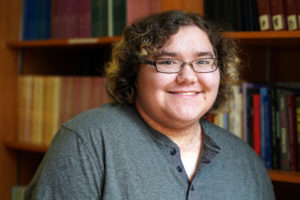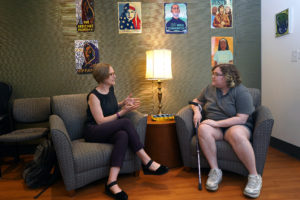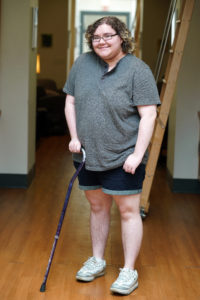Ren Koloni wants to make academia a more welcoming place for people like them. And at the University of Mary Washington, Koloni found space where they could do just that.

Koloni, who identifies as transgender and nonbinary – neither male nor female – and uses they/them pronouns, is autistic and has multiple disabilities. UMW appealed to the Virginia native because they could move around campus with few accessibility issues. It’s also an inclusive university where they felt that they – and their name and pronouns – would be readily accepted by the campus community.
“UMW has been a genuinely wonderful place to be nonbinary,” said the sociology and women’s and gender studies major, who praised the university’s commitment to the queer community. “I remember being a trans kid desperate to find colleges that would be OK with using my pronouns, let alone those that would nurture me as a person, especially as a trans person, and student.”
At Mary Washington, Koloni has explored meaningful personal topics such as gender, queer, autism and disability studies. Under the guidance of supportive and accommodating professors, they’ve conducted groundbreaking research into the linguistics of the transgender community and the intersections between queerness and autism.
“My thesis, ‘Neuroqueering Gender’ refers to this practice that autistic people have of paving our own gender paths. And those gender paths are undeniably, proudly and beautifully autistic,” said Koloni, who explained that the autistic community has often been silenced by allistic (nonautistic) people. Koloni’s findings show that people with autism frequently identify as nonbinary. “I want my research to help autistic voices be heard – even if they are nonverbal.”
Among those who have had an impact is Associate Professor of Sociology Tracy Citeroni, who helped fuel Koloni’s interest in medical sociology.
“Ren is one of the most organized, disciplined and intellectually strong students I’ve worked with at Mary Washington,” said Citeroni, Koloni’s advisor and thesis sponsor. “They are incredibly adept at independent scholarship and will certainly make UMW proud through their graduate work and beyond.”

Koloni has also found tremendous encouragement across disciplines. In sociology and women’s and gender studies, LaWanda Simpkins nurtured their passion for gender and disability justice and inspired them to want to teach at the university level. In a linguistics course taught by Janie Lee, Koloni worked on trailblazing research into discourse and medical transition in the transgender community. Chris Foss shaped their entrance into disability literature and offered advice about graduate programs in the field. And Honors Program directors Kelli Slunt and Mara Scanlon have supported them through the program, which Koloni has been a part of since day one.
“At UMW, there’s been so many times that professors have told me I should pursue publication of my research,” Koloni said. “They’ve treated me as an equal and expressed pride, admiration and true interest in the work I’m doing.”
But it hasn’t all been easy. Koloni’s disabilities – they were born with a genetic condition that causes joints to dislocate, and they have fibromyalgia – cause chronic pain and sometimes even leave them bedridden. Koloni praised UMW’s Office of Disability Resources, which helped them negotiate a lighter course schedule and coordinate with professors when they are unable to attend class.
While being a part of campus organizations is often too physically and mentally taxing, Koloni relaxes by making art and music, assembling carefully curated playlists and volunteering on a blog for transgender youth. They also enjoy playing World of Warcraft, which inspired them to do a linguistics study on gendered race relations in the game.
While Koloni has encountered discrimination in Fredericksburg, they were thrilled to find a vibrant LGBTQ+ community at UMW.

“I get a lot of inspiration from talking about trans philosophy with my friends,” said Koloni, explaining that transgender people create new selves through the process of transition. “We make our bodies and ourselves wholly our own. That’s why I’ve done this research at Mary Washington.”
Koloni also struggles with mental health issues such as complex PTSD. They’ve pushed for use of trigger warnings at UMW, alerts that distressing topics are about to be discussed, which can prevent them and peers like them from being retraumatized. While some professors have adapted more quickly than others, the response has been positive overall. “Making trigger warnings a staple of academia – and integrating other access needs – is one of the main goals of my career.”
And their career plans are exciting, indeed. Koloni received a merit scholarship from George Washington University’s English graduate program, renowned for disability and queer studies. They’re eager to learn from scholars who can help them cultivate their interdisciplinary interests and achieve their goals of encouraging others in the queer, autistic and disabled communities to find their voices. Just like the Mary Washington professors who have cheered them along these last four years.
“The brazen support and trust I’ve gotten at UMW has meant so much to me. It’s helped me realize that no matter where I go in academia, someone will be behind me, even if they haven’t ever seen someone do things the way I do them.”